News archive 2018
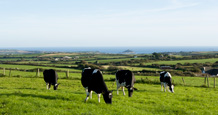
Exeter research helps shape Government blueprint for natural environment
Pioneering research from the University of Exeter has helped shape the Government’s new blueprint to improve the natural environment.
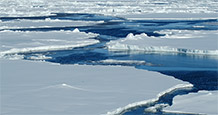
Future Climate Change Revealed by Current Climate Variations
Uncertainty surrounding the extent of future climate change could be dramatically reduced by studying year-on-year global temperature fluctuations, new research has shown.

Coral Reefs are in trouble - how can people adapt?
An international team of scientists has developed a strategy to boost people’s ability to adapt to climate change, revealed in a new study published in Nature Climate Change.

Payments to protect carbon stored in forests must increase to defend against rubber plantations
Efforts to protect tropical forests in Southeast Asia for the carbon they store may fail because protection payments are too low, according to new research.

Oxygen loss could be a huge issue for oceans
A major study into an ancient climate change event that affected a significant percentage of Earth’s oceans has brought into sharp focus a lesser-known villain in global warming: oxygen depletion.

Climate change could raise food insecurity risk
Weather extremes caused by climate change could raise the risk of food shortages in many countries, new research suggests.

Geoengineering risks losers as well as winners for climate and wildfire risks
Artificially altering the climate system to limit global warming to 1.5C could increase the risks of wildfires in some areas, new research suggests.

Hungry birds as climate change drives food ‘mismatch’
Warmer springs create a “mismatch” where hungry chicks hatch too late to feast on abundant caterpillars, new research shows.
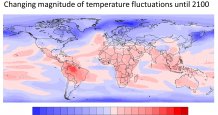
Temperature swings to hit poor countries hardest
Temperature fluctuations that are amplified by climate change will hit the world’s poorest countries hardest, new research suggests.
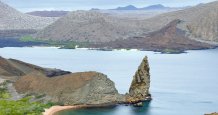
Could Galapagos become plastic pollution free?
There is a growing movement in Galapagos to drastically reduce marine plastic pollution with the aim, one day, of having a plastic-free Galapagos Marine Reserve.

Exeter-Hong Kong centre to promote environmental sustainability and resilience
First of its kind Joint Centre in Hong Kong
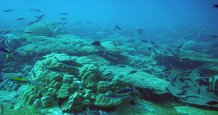
Coral reefs losing ability to keep pace with sea-level rise
Many coral reefs will be unable to keep growing fast enough to keep up with rising sea levels, new research suggests.

World’s first animals caused global warming
The evolution of Earth’s first animals more than 500 million years ago caused global warming, new research shows.

New Exeter institute to tackle ‘global challenges’
How can our planet and its people flourish as the human population reaches an estimated 9-11 billion?

Forests crucial for limiting climate change to 1.5 degrees
Trying to tackle climate change by replacing forests with crops for bioenergy power stations could increase the amount of CO2 in the atmosphere.

Knowing your neighbour cares about the environment encourages people to use less energy
Giving people information about how much gas or electricity their neighbours use encourages them to use less energy, research shows.

Famous theory of the living Earth upgraded to ‘Gaia 2.0’
A time-honoured theory into why conditions on Earth have remained stable enough for life to evolve over billions of years has been given a new, innovative twist.

Big Bang scientist to launch new talk series
A top scientist who helped discover the Higgs Boson particle and worked extensively on the Large Hadron Collider will speak at Exeter Phoenix this Thursday (27 September).

Exeter expert shortlisted for NERC Impact Awards 2018
4,000 tons of microbeads no longer released into ocean after pioneering plastics research

University of Exeter team pioneers virtual field trips in 3D
3D gaming technology is being used by a team from the University of Exeter to take students and researchers on virtual field trips to the Arctic Circle.
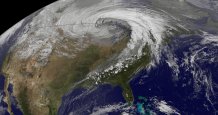
Climate change could lead to threefold increase in storms that bring flooding to Europe and North America, research shows
Powerful storms that cause extreme weather conditions such as flooding across Europe and North America could increase threefold by the end of the 21st century.

Exeter experts among world’s most influential scientists, according to new ranking
Leading academics from the University of Exeter have been recognised as being amongst the world’s most influential researchers, according to a prestigious new ranking.

Extreme heat damaging health and livelihoods and threatening to overwhelm world’s hospitals
New research published in The Lancet medical journal shows that rising temperatures as a result of climate change are already exposing us to an unacceptably high health risk. It warns, for the first time, that older people in Europe and the East Mediterranean are particularly vulnerable to extremes of heat, markedly higher than in Africa and SE Asia.

Scientists secure prestigious awards for global impact of microplastics research
A team of researchers has won two prestigious awards for the impact of work highlighting the presence, and potential impacts, of microplastics in our oceans.

Turning climate change from a ‘tragedy of the commons’ to positive action
Climate change must no longer be viewed as a “tragedy of the commons”, researchers say.

Exeter research ranked among the most influential of 2018
Research conducted by Exeter experts has been recognised amongst the top 100 influential in 2018.

What if global warming passes 1.5°C?
What will happen if humanity fails to limit global warming to 1.5°C?
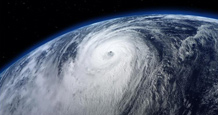
Crucial environmental research receives major funding boost
Pioneering new research on major environmental issues, led by scientists from the University of Exeter, have received a major funding boost, it has been announced.

£1 million circular economy research hub at the University of Exeter to re-think plastics production and use
The University of Exeter has been awarded £1 million to create a new centre to tackle the use of plastic and plastic waste.

Research sheds new light on what drove last, long-term global climate shift
The quest to discover what drove the last, long-term global climate shift on Earth, which took place around a million years ago, has taken a new, revealing twist.
